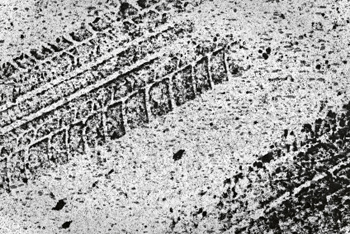Editor’s note: Faith & Leadership offers sermons that shed light on issues of Christian leadership. This sermon was preached during the 2009 Glen Workshop in Santa Fe, New Mexico.
I don’t know if you have a lot of opportunity to contemplate roadkill, but out in the country where I live the opportunities are endless, all year round. And if you run the same path day after day, you can even watch the surprisingly swift process of decay -- from blood to bones, wet to dry. One day the deer is fairly intact. The next, some dog has dragged off the head.
I’ve been thinking about it, and I think you only have to encounter roadkill once or twice before you begin to develop gnostic tendencies (release the spirit, man, from this gore on the road). One second, alive; the next, flat on the road -- not just dead but splayed open. Organs that used to mean life -- useless. What “good” is that flesh? The flesh doesn’t seem beautiful and true; it is full of flies and maggots.
It’s no wonder we tell our children stories of disembodied souls. The disembodied soul seems comforting in the face of the disemboweled.
Humanity has been struggling for a long time with the fact that we are flesh: bones and organs and gray matter -- all subject to decay. It’s uncomfortable, sometimes, being flesh. And it doesn’t seem very good, sometimes, because it dies. It’s mostly that. It’s also disconcertingly -- despite sometimes heroic and sometimes pathetic and often enormous efforts -- a little out of our control. The hair grows uncontrollably, sometimes out of the nose, or falls out. The skin wrinkles. The bowels move.
Of course there’s Botox and plastic surgery and the gym and permanent hair removal and hair implants, but you can’t liposuction your way into immortality. We are material that is decaying rapidly (if you consider the scope of time).
We are also, in our physical being, almost shockingly needy -- needy of 10,000 things: calcium, sleep, and vitamins A, B, C, D and E. We need the sun and oxygen and water and the wind to carry seeds. We need some things -- lots of varied things -- to eat. We need a mother, or at least someone else’s egg and sperm even to begin to “be.” Embodied life is life, really, only in relationship. The flesh may be efficient, but it’s far from self-sufficient. It’s needy and vulnerable.
Perhaps it’s because we know intimately the difficulty of being flesh that we often tend toward “truth” that is immaterial, somehow disembodied, spiritual as opposed to physical -- something more noble, less sweaty, nonrelative, more dignified than our organs allow.
There are gnostic creation myths, founding narratives, that tell of an absolute god who is untainted by any sort of association with materiality -- a god who is pure truth and beauty, maybe remote and unknowable but flawless perfection. According to these stories, there is a junior, lesser god descended in some way from the absolute supreme being. And it is this not-so-good junior god who created the world (often, it is said, with the malevolent intention of trapping aspects of the divine in materiality). The not-so-good junior god created the world, and it wasn’t good. It was more of a dreadful material limitation.
In these myths the plight of humanity (some of which has a divine spark) is to find its way back to the absolute -- to escape this material prison and find its way back to the place of purity and light. This is quite a bit different from the story most Christians claim as their founding saga.
But the idea that salvation has to do with the mind or the spirit transcending its physical support system seems to persistently appeal. Loathing the flesh has been a consuming Christian passion at times. Medieval hagiographers praise the female saints for such “amazing holy feats” as “eating nothing” for three years. Mary of Oignies mutilated her flesh out of guilt over having eaten and then fasted for seven months. Ida of Louvain, so the stories go, ate only moldy bread; she didn’t want anything to pass her lips that tasted pleasant. Once she went for 11 days eating only the little flowers of the lime tree.
One biographer writes rapturously of a maiden whom he praises because she excreted nothing from her pores; “she never sweated ... , discharged no filth or dandruff from her hair, and only occasionally gave forth spittle from her mouth or tears from her eyes.”
It’s strange that you get this so often and so persistently and so blatantly in so many different ways all across the spectrum of the Christian tradition -- a faith whose founding narratives are from the Hebrew Scripture, where God reaches in the dirt and forms the human body and breathes life into the nostrils of the muddy creature. It’s a faith that has as its central moments creation, incarnation, resurrection -- all decidedly physical.
The Judeo-Christian narratives are about a God who brings forth swarms of living creatures, swarming and creeping, fruitful and multiplying, “every living thing that moves and creeps and every green plant” -- fungi, membranes, bowels, bulbs, suckers and buds sending out runners and tubers, splicing and crossbreeding. And God says it is good. Very good. Resoundingly good. We have a radically embodied faith.
You might think the resurrection would be the place where at last the story would turn to celebrate the soul freed from its imprisonment in gross matter. But it doesn’t. Jesus doesn’t defeat death, make it nontoxic, by becoming disembodied; he does it by coming back from death, fully in his body. It’s a weird story, admittedly.
Jesus appears to his disciples after he has been dead for two days, in this story in the Gospel of John. And he is (for John) uncharacteristically quiet. He hardly speaks. He takes off his shirt, and he shows the disciples his body and his scabs, and then he breathes on them. From his diaphragm and his lungs, he expels his carbon dioxide waste into their mouths, over their tongues. He breathes on them and says, “Receive the Holy Spirit” -- take it, into your nose.
God gives us life in our bodies -- gives us the Spirit in our bodies. I don’t understand a lot, but this seems pretty clear. How great if we could find that good, really thoroughly good? What if we woke up in the morning and opened our eyes and we were astounded? “Wow! I have eyes. How astounding!” What if we ran our hands over our skin -- “Wow! I have skin!” What if I didn’t have skin? I love having skin. I like flesh. I like having a mouth and bones and blood. I like growing hair. Excreting? Spittle? It’s all right. I love tasting pleasant things. I might like to eat the flowers of a lime tree, but I also like hamburgers.
What if we woke up every morning and we felt how marvelous, how astounding it is to have bodies?
I want my children to grow up grateful for their flesh -- not loathing, not even nervous about it. It’s no enemy; it’s life. The flesh isn’t something dark, lurking around to entrap us; it’s who we are.
Maybe it’s impossible to be so grateful for the flesh because it really hurts sometimes to just get out of bed. It hurts to have a body -- to feel pain, to break the skin and bleed. It’s painful to have your heart broken. You feel it all over your body -- anger and tears. If you didn’t have a body, what would hurt?
But the stories that give life to hope in the Bible are not about us transcending the material world. They are about a God who gets all mixed up in it -- a God who actually gets a body, feels, eats, cries, dies. Maybe it’s an odd comfort: God doesn’t alleviate our fears of death by disembodying our souls but by joining us there.
Our relationship with God isn’t some sort of antimatter, disembodied, out-there thing. It’s in our breath and our blood, in our chest and tears and hunger and longing and gratitude and our pain.
Our relationship with God is as beings with bodies.
I don’t know if there’s such a thing for human beings as disembodied relationship. What could that possibly even mean? The muscles in our tongues are vital to relationship; it’s how we talk. We hear because of twisting, tunnel-like tubes, tiny bones, and microscopic hairs and air molecules that vibrate. Our emotions are physical. We feel in our guts more than our brains, but even our thoughts are physical -- neuroelecrtric chemistry, energy, molecules, atoms.
There’s really no meaningful sense in which you can separate the material from the spiritual, and the biblical witness doesn’t point us toward trying.
The other disciples tell Thomas, “We’ve seen the risen Lord.” Thomas replies, “Unless I see in his hands the print of the nails and place my finger in the mark of the nails, and place my hand in his side, I will not believe.”
Somehow, for this, Thomas has a bit of a bad reputation, as if there were some sort of shame attached to being so blatantly a sensual, physical bodily being. But Jesus doesn’t respond to Thomas’ need by shaming him. Jesus gives himself to be felt. Jesus comes back to the room when Thomas is there, like he’s looking for him, like he’s eager. Jesus says, “Thomas, put your finger here. Put out your hand, and thrust it into my side.”
There’s something vulnerable about this story from both sides -- what Thomas needs and what Jesus is willing to give to be known. Jesus gives his body and his breath and his blood.
The Christian faith has at its center a story about how God became flesh and blood. It’s the “event” that gives life to the Christian faith, and it’s weird and complicated and ceaselessly scandalous and beautiful -- though the beauty includes death and decay and dirty fingernails: the body of Christ. We eat it every week at church. We take it into our hands and put it in our mouths. We eat the broken body of Christ. What does that do to us?
The desire to escape the body has been an enormous influence in the history of civilization, philosophy and religion. This hasn’t always been a plus for the well-being (for the life) of the material world (to put it mildly). If the created world is mostly something to escape, why not strip mine, clear cut and spray pesticides and herbicides? The disdain for flesh contributes to slavery, oppression and genocide. It doesn’t do much for the health of our personal psyches either.
The body of Christ points to a God who lives in some unfathomable way with us and in us, not distant -- not quite knowable, either -- and yet somehow intimate, loving us in every cell of our being.















